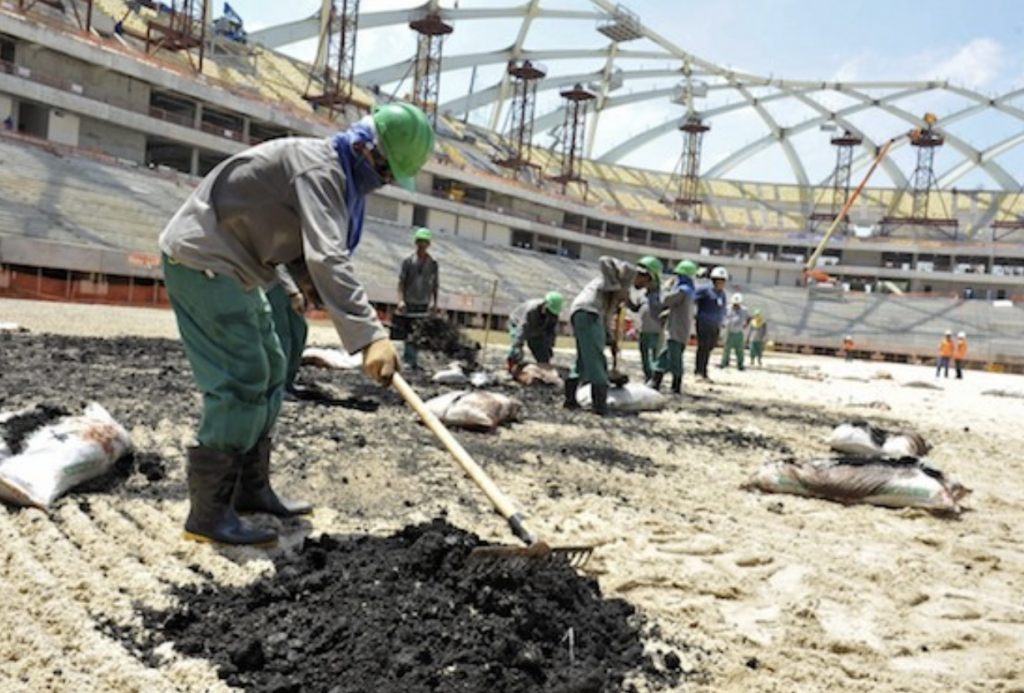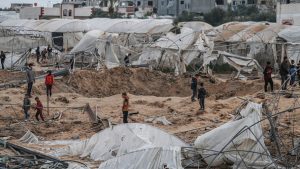The World Cup began in Qatar on Sunday, accompanied by a flurry of mainstream media attention. But little to nothing is being said about the country’s notoriously exploitative regime. Trade unions and political parties are banned, and freedom of the press is limited, let alone liberal democracy. On August 5, 2019, thousands of construction workers won a strike against brutal working conditions and unpaid wages. This marked the beginning of various demonstrations that occurred over the years in the stadium and infrastructure construction sites for the World Cup.
FIFA has a long-standing history as a battleground for political influence. Benito Mussolini bought votes for the 1934 World Cup to legitimize his military dictatorship in Italy. For the Gulf countries, sport is a means of sanitizing their reputations, increasing their international political influence, and attracting investments by organizing major competitions in the media spotlight. They have also bought prestigious clubs, including Manchester City and Paris Saint-Germain, and they sponsor both FC Barcelona and FIFA. But how did a country a third the size of Puerto Rico manage to reach this position in the geopolitical arena?
From Pearl Producers to Ferrari Manufacturers
Qatar was a British colony until 1971, famous for its pearl production and deep poverty, and for harboring the most radical wings of Islam. From the 1990s onward, however, its growth was meteoric. Fundamental to this were its relations with the United States, which was engaged in the first Gulf War from 1990 to 1991. Qatar played a key role in supporting imperialism by lending its Air Force’s al-Udeid Armed Forces base, located 32 kilometers from Doha. This base, which houses around 5,000 soldiers, has since been used for the vast majority of U.S. military operations in the Middle East, from the invasion of Iraq in 2003 to the current tensions with Iran.
In 1995, Hamad bin Khalifa Al Thani staged a coup d’état against his father; both belonged to the ruling family, which had maintained the tribal balance in the peninsula for centuries. From that moment on, Khalifa began a series of internal structural reforms, particularly on the economic front. He invested in liquefied natural gas (LNG), a technology that was not yet very developed. This allowed the peninsula to transport gas from the largest reserve in the world to any part of the globe. LNG is today essential for supplying energy to Europe, particularly in the context of the war in Ukraine.
This is the basis of Qatar’s wealth, which enabled the country to create large investment funds as part of a plan of economic diversification. They became major shareholders of large multinationals such as Volkswagen, Iberdrola, and Rosneft, among others. They became the fourth-largest real estate investor in the United States and a major investor in the City of London. This is the plan for the future, when the country’s 160 years of gas reserves are exhausted.
In little more than 20 years, Qatar has become the richest country in the world: at $137,000, it has the highest GDP per capita. Although 3 million people live on the peninsula, only around 300,000, or 12 percent, are considered citizens. Indians, Nepalese, Bangladeshis, Filipinos, Egyptians, and other nationalities make up the rest of the population as part of a monumental absorption of labor owing to the demand caused by gas extraction. In total, there are an estimated 23 million migrant workers in the Arabian Peninsula.
Qatar developed the most advanced and open political system of all the emirates by establishing the Consultative Council, a 45-member parliament — which only citizens vote for and in which parties are banned — with a national constitution. The country invested in a high-profile educational system with international universities. The capital, Doha, is a financial center that competes with the big world players; multibillion-dollar deals are closed in the city’s West Bay. In addition, the country has opened religious centers for all denominations. Qatar is thus seen as a true oasis amid the “petromonarchies.”
In contrast to neighboring Saudi Arabia, Qatar maintains commercial openness, has a relatively liberal political system, and has advanced in internal reforms. All this has helped raise the regime’s geopolitical aspirations. Qatar sought to distance itself from the interests and policies of Saudi Arabia after the 1991 Gulf War, fearing the Saudis would occupy the country, as they did Kuwait. In 2003, Qatar gained regional importance when Riyadh expelled U.S. troops from its territory after it accused the monarchies of harboring terrorists. But Qatar, even though it is also a monarchy, allowed the U.S. to establish a base within its borders.
One of the pillars of its geopolitical influence is the state-owned news network Al Jazeera. It was founded to gain regional influence, to maximize “friends” and limit “enemies.” Al Jazeera openly supported the Arab Spring, gaining enormous regional prestige, although its local edition is much more controlled. It is open to all political and religious currents, such as Hamas, Hezbollah, the Taliban, and officials of the State of Israel, and it has also criticized the rest of the Gulf monarchies.
Internally, Al Thani renewed the councillors, called for free municipal elections in which women were allowed to vote, and created the role of the country’s first lady. But the central personality of power would remain the emir (king), and freedom of the press, political parties, and trade unions would continue to be prohibited.
Al Thani’s policies led to ties with the Muslim Brotherhood, providing fundamental support during the Arab Spring. It also led to ties with Iran and Turkey, both of which were key to evading the economic blockade imposed in 2017 by Saudi Arabia and the rest of the Arab monarchies belonging to the Gulf Cooperation Council (GCC), an economic and military alliance created in 1979 to contain Iranian influence. Qatar’s position now makes it a regional actor of decisive weight in the open geopolitical conflicts with Iran.
A World Cup of Slaves
As soon as Qatar bought the FIFA votes to host the 2022 World Cup, it began the titanic task of constructing stadiums, hotels, and infrastructure for hosting. The fate of the competition rested on the shoulders of 2 million South Asian and African migrant workers who dared to balance on top of the country’s ostentatious skyscrapers.
The successive strikes carried out by Nepalese, Indian, and Bengali workers are shattering Qatar’s image in the world arena. They have made visible the true basis of accumulation of the Qatari economic model: the kafala system of sponsorship (or, more accurately, of semislave labor). Its basis is gross mistreatment and lack of labor rights. Qatari employers can withhold the passports of migrants and threaten them with deportation to extort them to do whatever they want. Workers have to ask for permission if they want to leave the country or change jobs. They work overtime, 16 to 18 hours a day for just $200 a month — if they’re paid on time — and live a life of overcrowding in the country of skyscrapers.
Worse still, construction work is outdoors, as it is anywhere in the world, which in Qatar means toiling in temperatures of up to 122 degrees Fahrenheit (50 degrees Celsius). The number of deaths so far due to high temperatures and abysmal working conditions since Qatar was awarded the tournament 10 years ago is 6,500. If the 2022 World Cup were to have a minute of silence for each dead worker, the tournament would have to be played in silence.
These horrific working conditions led to an explosive wave of strikes that made visible the subhuman working conditions for migrant laborers in Qatar despite the prohibitions. They held a picket on the Dukham highway, where hundreds of South Asian workers participated. The protest helped win collective bargaining, a minimum wage, and payment of wages owed, as well as the imprisonment of company officials for international labor law abuses. The Qatari regime, however, did not abolish the kafala as a system of bondage, the workers’ main demand.
The Qatari government, which has close ties to the construction companies, claimed in a report on August 22, 2019, that they are going through a financial crisis, using this to justify that lack of payments. Yet they showed unprecedented flexibility in addressing the scandal, despite not tolerating any protests. On the other hand, the Qatari government’s financial crisis is based on tensions with Saudi Arabia, the United Arab Emirates, and other members of the GCC, which have been withdrawing funds from Qatar’s financial system to generate a liquidity crisis after almost a decade of estrangement since the rivalries initiated by the positions taken in the Arab Spring. This ended around 2021, when relations began to rebuild.
This geopolitical conflict will likely keep Doha from guaranteeing minimum labor rights and abolishing the kafala system. The regime will need more and more slave labor to sustain its financial and gas empire. It will have to decide between confronting the Gulf monarchies or a mostly migrant workers’ movement, one that is rebelling against the petromonarchy.
Originally published in Spanish on November 18 in La Izquierda Diario.
Translation by Otto Fors










